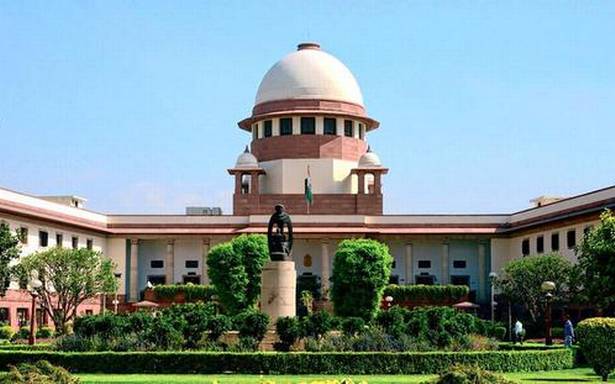Union has been mentioning the case before SC back-to-back on two days; highlighting NEET counselling in limbo
A three-judge Special Bench led by Justice D.Y. Chandrachud is scheduled to hear on Wednesday a case raising questions on the ₹8-lakh annual income limit criterion fixed to identify the economically weaker sections (EWS) of society for extending reservation benefits.
The development came hours after Chief Justice of India (CJI) N.V. Ramana on Tuesday agreed to adjust the various combinations of the court’s Benches, fixed for the week, to accommodate the case. The other two judges on the Special Bench are Justices Surya Kant and A.S. Bopanna.
Also read: Supreme Court to consider urgent hearing of EWS quota case
The Union government, represented by Solicitor General Tushar Mehta, has been making back to back oral mentionings before the court, on January 3 and 4, to hear the case quickly.
January 3 — the very day the court reopened after Christmas holidays — had seen Mr. Mehta plead with Justice Chandrachud, who has been hearing the EWS case, for an urgent listing.
On Tuesday, again, Mr. Mehta came up before the CJI’s Bench to press for a hearing on January 5 itself.
‘Medical admissions delayed’
Mr. Mehta underscored that NEET counselling was suspended since late November because of the questions raised about the criteria in the EWS quota. Medical admissions were getting delayed, and the issue had to be resolved quickly.
Resident doctors in Delhi had recently organised a massive protest over the delay in the counselling schedule, leading to violence.
Mr. Mehta submitted to the court that the doctors were rightly agitated about their future prospects. He urged the CJI to list the case on January 5.
During the interaction, Chief Justice Ramana said the court’s Benches have already been fixed for the entire opening week of miscellaneous hearings. The EWS case was heard by a Bench of three judges led by Justice Chandrachud while the Benches were sitting in a combination of two judges for the week.
But Mr. Mehta persisted that even a two-judge Bench led by Justice Chandrachud would be enough to hear the case as long as it was scheduled on Wednesday.
The CJI finally agreed in court to see whether the schedule could be juggled to form a three-judge Special Bench.
NEET counselling was suspended after the Union government, on November 25, informed the court about its “considered decision” to revisit the “criteria” determining EWS. The government had asked for four weeks to form a review committee, examine the issue and file a report.
The government’s submission followed rounds of grilling from the court in past hearings to reveal the logic and study before zeroing in on the “exact figure” of ₹8 lakh as the annual income limit to identify EWS of society.
Review committee
The Centre had formed a review committee comprising Ajay Bhushan Pandey, former Finance Secretary; Professor V.K. Malhotra, Member Secretary, ICSSR; and Sanjeev Sanyal, Principal Economic Advisor to the Government of India. The panel submitted a report on December 31, supporting the ₹8 lakh income threshold as a “reasonable” basis to determine EWS.
“The current gross annual family income limit for EWS of ₹8 lakh or less may be retained. In other words, only those families whose annual income is up to ₹8 lakh would be eligible to get the benefit of EWS reservation,” the report stated.
The committee has maintained that the ₹8 lakh criterion struck a “fine balance” between overinclusion and inclusion errors.
“The figure ensures that most low-income people who are not required to pay income tax are not excluded and are covered in EWS and at the same time it should not be so high that it becomes overinclusive by including many income tax-paying middle-and high-income families into the EWS,” the report observed.
The court’s query was significant as the One Hundred and Third Constitutional Amendment of 2019, which introduced the 10% EWS quota, is itself under challenge before a larger Bench. The Amendment is under question for making economic criterion as the sole ground for grant of reservation benefits.
Source: Read Full Article

